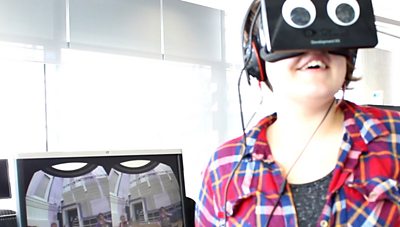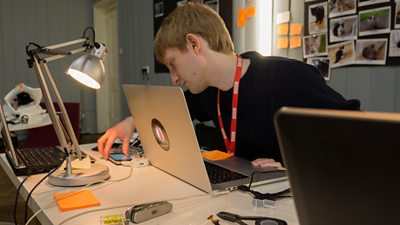Considering a career in media technology? Our technologists share their experiences – and offer their tips for getting into the industry.

Rhianne Jones, UX Research Scientist
What were you doing before you joined ����tv R&D?
Before joining the ����tv, I was a postgraduate student researching social media technologies and social media practices. After completing my BA in Sociology, Media and Cultural Studies I went on to study for an MA in Social Research and then a PhD in the Sociology of Digital Media. I came to the ����tv with research experience and skills but lacked media industry experience. The traineeship gave me the opportunity to apply my knowledge and research expertise whilst at the same time gaining experience in interaction design, UX (User Experience) and applied HCI (Human Computer Interaction).
Jasmine Cox, Designer
What were you doing before you joined ����tv R&D?
In the summer of 2012, I was in the middle of a masters degree in Product Design. Up to that point I had an undergraduate degree under my belt plus a few years’ experience in the wilderness, selling books and driving fork-lift trucks and ice cream vans. I wanted to start a new challenge.
How did you get into ����tv R&D?
I applied for a role funded by the FIRM Internet of Things collaboration, and promptly didn’t get it. I did impress the interviewing panel though as I bring a hybrid mix of creative skills. My forté is making things, user experience, and blending digital and analogue experiences with objects; focussing on industrial, mechanical and electronic design. Luckily an amazing person took a chance on me and offered me a placement for two months. They haven’t managed to get rid of me yet!
Working in R&D has brought a great deal of scientific discipline to my work, not to mention exposure to a massive variety of projects and superb collaborations internally and with industry. I really enjoy the breadth and depth of work in the department, I get to work with some incredibly clever and creative people.
What top tip would you give to someone interested in a career in technology?
My top tip for anyone considering applying for a job/trainee scheme is to do and talk about what you love. Passion shines through – and experience has just as much value as qualifications.

Sam Bason, Technologist
What were you doing before you joined ����tv R&D?
I had just finished my masters degree in Electronic Engineering when I joined ����tv R&D. I had previously done a three month internship at a luxury car company, so I had some experience of working in industry, but I think the most important experience I had in media was being heavily involved in student radio. I undertook roles doing everything from marketing to presenting to crucially becoming head of technical services.
How did you get into ����tv R&D?
The assessment process at ����tv R&D was split into two parts: a presentation and an interview. The way to impress with the presentation is to really know the subject you’re talking on. I really did my research and that made the follow-up questions in that session much easier.
Don’t worry if you don’t immediately know the answer to the questions they ask. The interviewers are looking for how you approach problems and how you draw on, and demonstrate, your existing experience and knowledge to come to an answer. Never be afraid to say “I don’t know” – but know where to start on giving your best guess.
What top tip would you give to someone interested in a career in technology?
You can’t fake knowledge in, and real passion for, a subject. I’d recommend anyone interested in getting into media, technology or otherwise, seeks out their student radio while at university and throws themselves headfirst into it. I feel the combination of a great degree and the related extra-curricular activities really set me in great stead for a career in media technology.
Lianne Kerlin, Research Scientist (pictured right)
What were you doing before you joined ����tv R&D?
Before I applied to be a trainee at ����tv R&D, I was working as a Research Assistant in a university. So the majority of my skills were based around working on big research projects. I did lots of in-depth research, carrying out data collection and analysing, as well as writing for different audiences (e.g. academia and industry). I think being trained in both qualitative and quantitative research methods enables me to work on a range of projects, as well as think about the best way to approach topics.
What top tip would you give to someone interested in a career in technology?
It's important to be adaptable – projects can take any form! Problem solving and analytical thinking skills are definitely important for a career in technology. You should understand new practices and read about how technology is changing. And demonstrate passion too: you have to love what you do!
- -
- Profiles of our intake of trainees and graduates from |
- Our graduates on their experience at ����tv R&D One Year On -
- See what our trainees did for their introduction to ����tv R&D |
- Find out about ����tv R&D's and
